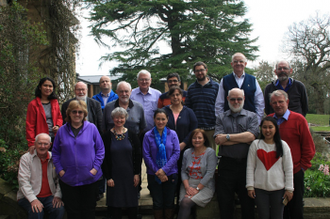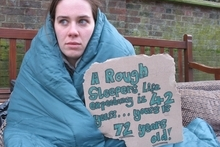Head of Housing Justice speaks to Columban missionaries

Regional group with Ellen Teague (front 2nd left)
Columban missionaries in Britain held their AGM this week. Information was exchanged on their work on Mission Awareness, JPIC, Lay Mission, Refugee outreach, Inter-religious dialogue and Cultural Exchange with China. One day was spent on the issue of Housing and Homelessness in Britain and it was led by Alison Gelder, Director of Housing Justice.
Alison first explained that Housing Justice is a national Christian organisation which is a Christian voice on housing and homelessness issues. It aims to raise awareness of the issues and of possible solutions, such as helping churches house homeless people. She reported there has been a slow build-up of Britain's housing crisis over the last 35 years.
Up to 10,000 people live on the streets in England and Wales, she said, and over 83,000 households were assessed by local authorities in 2015 as being homeless. More than two million people are hidden homeless - they don't have their own front door - and 1.3 million households are signed up with local authorities for social housing. 86% of homeless are male. Alison suggested that people become homeless for a variety of reasons: relationship breakdown, poverty, alcohol or drug abuse, poor mental health and coming out of institutional living, such as the armed forces.
The lack of affordable housing is a key problem and Alison pointed out that "housing for poor people has never been provided by the open market" but by Christian philanthropists. Sir Edward Guinness, for example, set up The Guinness Trust in 1890 aiming to provide decent and safe homes for working class people. With the current government's austerity programme in place since 2010, "people at the bottom have lost money, including housing benefit". Alison saw the rise of broad-based organisations as a grass roots challenge to state support being rolled back.
There needs to be discernment about what individuals, housing associations, local authorities, churches and communities can do. Alison suggested that action includes: sharing stories of people struggling with homelessness, being informed, easing the pain by humanitarian initiatives, increasing the supply of affordable housing and getting involved in local planning system. She urged involvement in the campaign against the Government's Housing and Planning Bill, which could see council tenants forced to move out of their homes due to sharp rises in their rent. The next Homeless Sunday will be held on 22nd January 2017.
Churches have been extremely active in initiatives such as night shelters which give immediate assistance to homeless people. Other Church projects have included: building social housing on church land or converting redundant churches or vicarage sites, involving church volunteers in support for housing association residents, addressing the spiritual needs of housing association tenants, such as supported housing for the elderly. Also, campaigning together on housing issues, and Church investment in housing provision - an ideal form of ethical investment.
For more information on the Columbans see: www.columbans.co.uk
Read more about Housing Justice here: www.housingjustice.org.uk


















